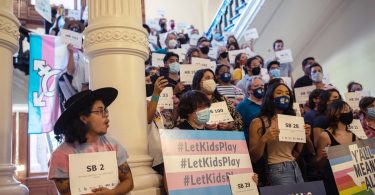Abortion rights supporters celebrate winning the referendum on Issue 1, a measure to enshrine a right to abortion in Ohio’s Constitution, in Columbus, Ohio, on Nov. 7, 2023. (Megan Jelinger / AFP via Getty Images)
It is no coincidence that at the same moment U.S. democracy is facing existential threats, we are also witnessing profound assaults not only on the body politic but on our bodily autonomy.
Consider the former: a violent insurrection threatening the peaceful transfer of power, disinformation campaigns intended to undermine trust in election results, state lawmakers attempting override the popular will through gerrymandering, new state laws criminalizing dissent, preemption being used to limit the power of local control, and attacks to the integrity of state and federal courts.
At the same time, the Supreme Court ignored 50 years of precedent to overturn Roe v. Wade, leading state politicians to ban abortion and local law enforcement to criminalize pregnancy outcomes, as school boards ban books about LGBTQ people and people of color. Trans people’s health and lives are on the line, as state legislatures target gender affirming health care and the very ability to participate in civic life.
The sum and substance of these attacks are clear: to consolidate power, particularly the power of white Christian nationalist men. One of the biggest threats to the consolidation of power is an empowered and engaged populace—particularly women, the LGBTQ community and people of color. Which is why anti-democratic leaders are doing all they can to limit and curtail the power of these communities.
This moment requires progressive and pro-democracy funders to understand the attacks to reproductive freedom, LGBTQ liberation and racial justice not as distinct or disparate—but as central to the attacks to our democracy itself, and to fund accordingly.
Authoritarian regimes and backsliding democracies across the globe are undermining bodily autonomy as a fundamental strategy to consolidate power.
In Brazil, Bolsonaro forged partnerships with conservative evangelists, espousing traditional gender roles and regressive policies, ultimately propelling him to power. Once in power, he has worked actively to undermine the voting rights and the judicial system, while simultaneously working to further restrict abortion access.
Putin, like many autocrats, consistently relies on homophobic and misogynistic messaging to sew distrust in the West, and to engender nationalism and support for his power and actions.
In Poland, Human Rights Watch notes that the attacks to reproductive freedom are directly linked to the dismantling of the democratic norms including the capture of the judicial branch and crackdowns on the right to protest. A recent report by the Williams Institute at the UCLA School of Law finds that attacks on LGBTQ people and their rights are a precursor to democratic backsliding.
These global trends should be sounding the alarm for everyone who is invested in the future of U.S. democracy. There are clear parallels between Russia’s 2012 law banning discussion of sexuality in schools and the “Don’t Say Gay” law in Florida. The threats to judicial independence and abortion access in Poland mirror what we are seeing at the state and federal level in the U.S. The moral panic that political leaders are inciting around trans people in the U.S. harkens back to Bolsonaro and Putin’s rhetoric demonizing the LGBTQ community.
As Erica Chenoweth and Zoe Marks point out, misogyny and racism are key tools of authoritarianism—which aims to exploit historical societal hierarchies such as race and gender to legitimize power and undermine democratic norms.
In the PolicyCast podcast, Chenoweth and Marks outline five key ways authoritarians marginalize and victimize gender minorities:
Attacking reproductive autonomy either through forced pregnancies or forced abortions; Blocking equal access to the workplace, political office, or public life; Reinforcing conservative values around traditional gender roles; Reducing penalties for domestic or sexual violence; and Reinforcing strict gender and sexual hierarchies where women are subjugated to men and LGBTQ people are criminalized.
For those of us deeply concerned about the threat of authoritarianism in the U.S., it is important that we see these attacks on reproductive freedom and LGBTQ rights as not simply “culture war” issues, but as a key strategy of those aiming to consolidate power and dismantle democracy.
In order to support a pro-democratic united front, the most essential action funders can take is to lead the way in breaking down silos. For democracy funders, this entails treating bodily autonomy as a necessary component of a healthy democracy. For funders of reproductive freedom and LGBTQ liberation, this means viewing attacks on the institutions and structures of democracy as direct threats to bodily autonomy. When judicial independence is attacked, and the right to protest curtailed, bodily autonomy is under threat. By strengthening and sharing commitments across our movements, we can more clearly understand and counter the collective threat.
What are some practical tips for moving out of our own silos?
Joining donor collaboratives that are focused on the intersection of these issues. Attending funder and field convenings such as the 22nd Century Initiative that are bringing people together across every movement to build a united front. Funding cross movement work at the state and national level that addresses structural barriers to full participation. Asking grantees about how they are seeing the threats to reproductive justice and democracy intersect. Funding reproductive justice and LGBTQ groups to work on democracy issues and partner with democracy organizations (and vice versa).
To stop the U.S. from backsliding into an autocracy, we must recognize attacks on bodily autonomy as part of the larger effort to consolidate power—and out-organize, out-strategize and out-fund our opposition at every turn. We need to build a pro-democratic united front.
Up next:
U.S. democracy is at a dangerous inflection point—from the demise of abortion rights, to a lack of pay equity and parental leave, to skyrocketing maternal mortality, and attacks on trans health. Left unchecked, these crises will lead to wider gaps in political participation and representation. For 50 years, Ms. has been forging feminist journalism—reporting, rebelling and truth-telling from the front-lines, championing the Equal Rights Amendment, and centering the stories of those most impacted. With all that’s at stake for equality, we are redoubling our commitment for the next 50 years. In turn, we need your help, Support Ms. today with a donation—any amount that is meaningful to you. For as little as $5 each month, you’ll receive the print magazine along with our e-newsletters, action alerts, and invitations to Ms. Studios events and podcasts. We are grateful for your loyalty and ferocity.







